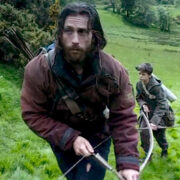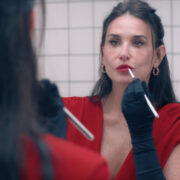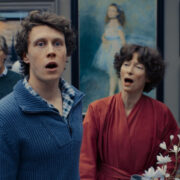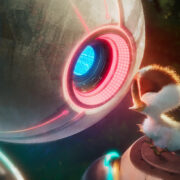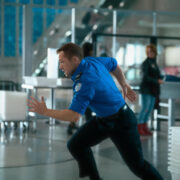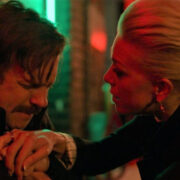Staff Inquiry: Sentimental Childhood Favorites

Alex is a film addict, TV aficionado, and book lover.…
We’re getting nostalgic with this month’s staff inquiry, as we highlight the films that stuck out to us when we were kids and we still remember fondly today. These are sweet, instinctual loves unfettered by analytical evaluation or acutely trained senses, so it’s kind of like you’re getting a glimpse at our uninhibited selves.
And our uninhibited selves like Disney, magic, animals, and grand adventures. You know, the stuff everybody loves. So kick back and let us take you down memory lane, because there’s sure to be some films here that spark a similar passion in you.
Tynan Yanaga – Old Yeller (1957)
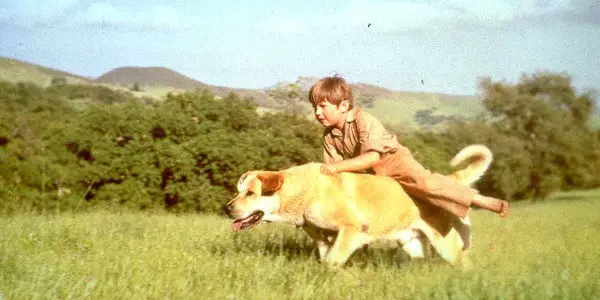
I nearly balked and chose another childhood favorite about a dog, Air Bud: World Pup, but there was a need to acknowledge Old Yeller, a film that takes you to the edge of heartbreak every time you watch it, especially as a kid. It’s the epitome of sentimental family-friendly entertainment done well. After all, that’s Disney’s bread and butter. I was born and bred on Disney myself.
Not simply their animated classics but the live-action fare too, from Swiss Family Robinson to Davy Crockett to The Absent-Minded Professor. In the higher echelons of such films was Old Yeller. We have two of Disney’s ubiquitous child stars in Tommy Kirk and Kevin Corcoran guided by the maternal influence of Dorothy McGuire and the assured direction of Robert Stevenson (Mary Poppins).
But the story doesn’t necessarily rely on those aspects as much as it’s bolstered by them. Because we’ve seen this story, yes, played over again and again. But the boy and his dog paradigm has arguably never been so joyously exuberant and ultimately achingly gut-busting as right here. Old Yeller goes from a mangy nuisance to a beloved, faithful member of the Coates clan. He so perfectly embodies that loyal quality that rightfully gained canines the moniker of man’s best friend. He’s not human, but he seems nearly capable of human-like empathy and understanding. That makes his constant heroics and final apotheosis to the big kennel in the sky all the more moving. Old Yeller on VHS was a cornerstone of my childhood. Rightfully so.
Andrew Winter – Bedknobs and Broomsticks (1971)
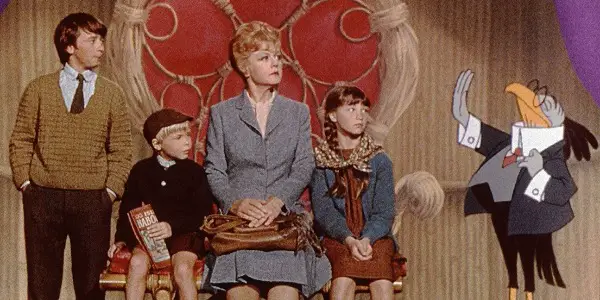
Bedknobs And Broomsticks wasn’t the first film I saw at the cinema (that was Disney’s animated The Aristocats), but it was the one that stuck most firmly in my mind and continues to delight cynical, grumpy, middle-aged me every time I come across it – usually on TV at Christmas – all these years, nay decades, later.
Another Disney production, Bedknobs was directed by Robert Stevenson, who had helmed Mary Poppins seven years earlier with great success. Although based on two children’s books by Mary Norton, the World War II-set movie is similar to Poppins in other ways too: its main character is a posh Englishwoman with magical powers (Angela Lansbury as the apprentice witch Eglantine Price), who looks after a brood of children (in this case three evacuees from London), while both mix live-action and animation, feature numerous songs, and boast David Tomlinson in the cast. Julie Andrews even turned down the lead role because she didn’t want to get typecast.
Many of the film’s most memorable scenes are the ones set on Naboombu, a land populated by anthropomorphic jungle creatures, with a monomaniacal lion – brilliantly voiced by Lennie Weinrib – as their king. The football match between two teams of animals – in which conman Emelius (Tomlinson) plays referee – is superbly realised, its visual effects standing up surprisingly well even today. Obsessed with football as a child, I remember being slightly disappointed that this was only a relatively small part of the film.
As you’d expect from a Disney movie, the songs are great, with The Beautiful Briny – written for use in Poppins originally – being my favourite. Although it is delightful and joyous, Briny always brings a lump to my throat, perhaps a bittersweet recognition of a more innocent time when my only concerns were watching Lost In Space on the telly and playing football in the street with my mates.
Emily Wheeler – Homeward Bound: The Incredible Journey (1993)
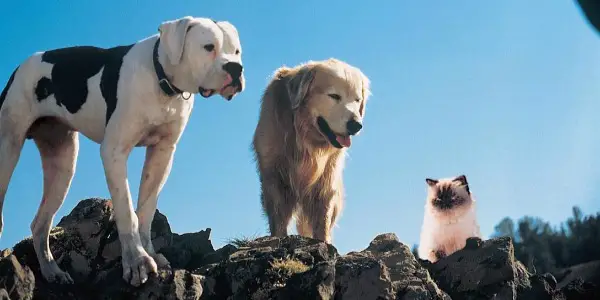
Long before cynicism or the concept of a stiff upper lip entered my life, I was emotionally wrecked by the tale of three pets finding their way home. I don’t recall if this was the first film I saw in theaters; in fact, I don’t remember seeing it in theaters at all, but according to family lore this cinema experience left my mom a little misty-eyed and me a soggy mess. The story checks out, because to this day the memory of Homeward Bound gets me choked up.
I’m not going to claim that I had immaculate taste when I was five, but there’s something indelible about the way competent pet films hit young animal lovers. The prompted emotions are so intense and new, a little taste of the way films will tap into deep recesses for the rest of your life. Like a drug, I returned to Homeward Bound again and again until I was laughing before the punchlines were delivered and the whole milieu had seeped into my pores.
And it is a sweet little film. An old dog leads an overgrown pup and a spoiled cat through the mountains after their human family leaves them with strangers. Each animal belongs to a child, and in-between all the silly capers and the voice-over conversations (helping the film out immensely are great vocal performances by Don Ameche, Michael J. Fox, and Sally Field) is a comforting message about holding tight to those you love. But really, it’s the timeless mechanisms and my age that made this thing unforgettable, and so I still carry the venerable Shadow in my head like the personification of dignity and blame gopher holes whenever I trip.
Benjamin Wang – Spirited Away (2001)
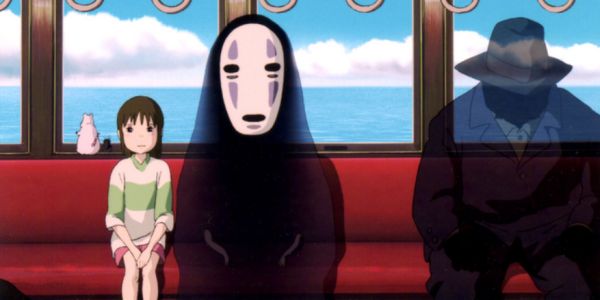
After I first saw Spirited Away at age 8, I said “that was the best movie I’ve ever seen.” Being able to say that was new to me: before, it wouldn’t even have occurred to me to give any movie that distinction. It was the first movie in which I noticed things expressed indirectly through gestures and without explication. I wondered: why did Chihiro cry after visiting the pig pen outside the bathhouse? Why was No-Face so kind to Chihiro and so violent toward everyone else? Why was Zeniba depicted so differently at the end of the film than before?
I asked myself these questions, and I asked people I knew who had also seen the movie. I didn’t come to understand the answers for a long time, but not understanding never put me off the movie. I didn’t need understanding to follow the emotional arc or how the characters worked out their problems. The parts I didn’t get, even before they started making sense to me, illuminated something: there are emotions we don’t see or only show to certain people under certain circumstances. I knew that there was something more going on in Spirited Away than what was straightforward, even if I wasn’t sure what it was.
It’s easier to understand now, but the moments that stood out to me then still stand out. They are still moments when something breaks through, where the contained or implicit becomes explicit. It’s never obscure, but these moments invite you to unfold and question it, even if you’re a child who doesn’t fully understand.
Kristy Strouse – E.T. the Extra-Terrestrial (1982)
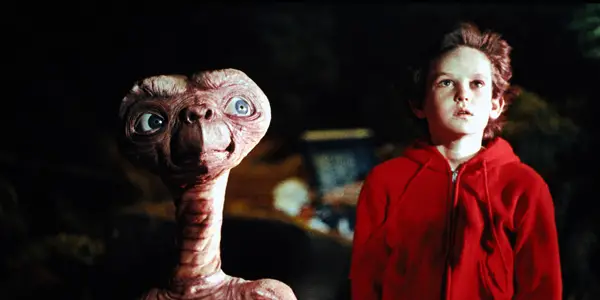
I want to preface this by saying that Tim Burton’s Batman was another frequent viewing experience for me when I was young, so I had a tough call to make here.
But then… not really.
Steven Spielberg’s 1982 sci-fi classic E.T. managed to move me (almost always to tears), scare me with its early, foggy eeriness, and challenge me as a youth to attempt to understand the complexities of film. When I would watch the movie, I felt connected to young Elliot (Henry Thomas) as he befriended the small, gentle extraterrestrial.
I felt hopeful, perplexed by the possibilities it awoke in my mind. As a child these might seem like ambitious contemplations, but that’s how impactful the material was for me, and as I’ve gotten older I’ve been able to wade through my thoughts in a more concise way. This wasn’t like anything else I had seen.
Now, still, the conclusion is the same. It’s an excellent piece of filmmaking. Spielberg’s choices, such as a low camera, captured from a child’s point of view, added to its power.
From a young age this movie, which is one of my favorites still, was always an experience. There is a certain ambiance that caters to the child in all us. Even now when I watch E.T. I’m brought back to the first time. It was a film that also managed to make science fiction feel personal, thus becoming an important part of my childhood.
Matthew Roe – Gettysburg (1993)
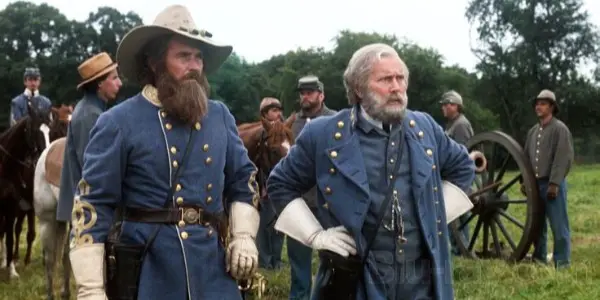
There are movies that I could consider to be a childhood favorite such as Toy Story, Spaceballs, and Batman: Mask of the Phantasm, but nothing compares to Ronald F. Maxwell’s 1993 Civil War epic Gettysburg, which I have watched hundreds of times ever since my father recorded a cable television rerun of it on VHS when I was roughly five years old.
A four-hour romanticization of the most costly battle in United States history isn’t usual for childhood nostalgia, but being such a history buff at the time that I would correct the Gettysburg Battlefield tour guides, it was right up my alley. As an adult, I still marvel on how the film never feels its length, the vast battle scenes with hundreds of extras are electrifying and superbly choreographed, and the stellar ensemble cast featuring Tom Berenger, Jeff Daniels, Martin Sheen, Kevin Conway, C. Thomas Howell, Richard Jordan, Stephen Lang, and Sam Elliott, among many, many others keep me completely invested with relative ease.
It does personify those involved as far more humanist and idealistic than they were, but its focus on the battle and its physical and psychological effects on the soldiers captures the humanity on both sides of the conflict with such a deep earnestness, that I couldn’t help but empathize with everyone on screen, in turn helping to determine my moral compass as a child. I even had a portrait of Colonel Joshua Chamberlain (played by Daniels) hanging in my room due to the respect that the film garnered from me.
Absolutely my favorite childhood movie, and I consider it today to be one of the greatest epics of cinema ever made, alongside Sergio Leone’s The Good, the Bad and the Ugly, Anthony Mann’s El Cid, and Werner Herzog’s Aguirre, the Wrath of God.
Jacqui Griffin – Bambi (1942)
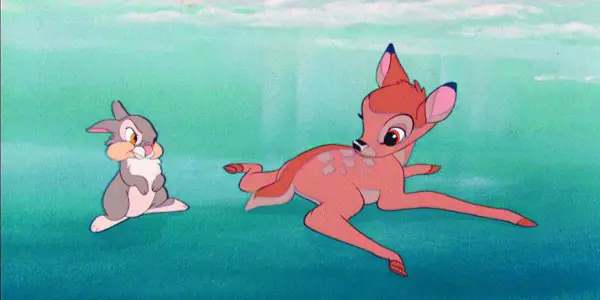
This month’s team collaboration excited me, as I’m sure it did many of my colleagues, because who doesn’t love the chance to reminisce about their favourite childhood memories? Bambi was the obvious choice to my mind, though over the years that revelation has been met with everything from shock to disgust (seriously). Where I suppose many young viewers were forever traumatised by the off-screen shooting and killing of Bambi’s mom (sorry, spoiler alert – but this movie came out in 1942 so…), I managed to remain utterly transfixed by the other 99% of the film. My mother will testify that I watched Bambi on a daily basis and that my obsession took over a large part of my life for a while, manifesting in a motorcycle riding imaginary Bambi friend.
As I’ve grown older and returned to the film, I have been overjoyed to find that not only does it grow with the viewer, offering an incredibly complex coming-of-age story, but it also displays some of the most interesting film techniques, especially for its time. I recommend re-watching the film and paying special attention to the sound design, or I should say, the score. Though my knowledge is by no means exhaustive, this is one of the only films I’ve encountered where sound effects are replaced perfectly, seamlessly, in fact, with the music. Raindrops fall with oboe notes. A crash into the snow is its own mini symphony. I never noticed this as a child, simply enjoying the film for its entertainment, and now as an adult, and one who not only loves but actively works in and around film, I am able to enjoy the film even more. Maybe my motorcycle riding imaginary friend is just looking out for me.
Jo Bradley – Peter Pan (2003)
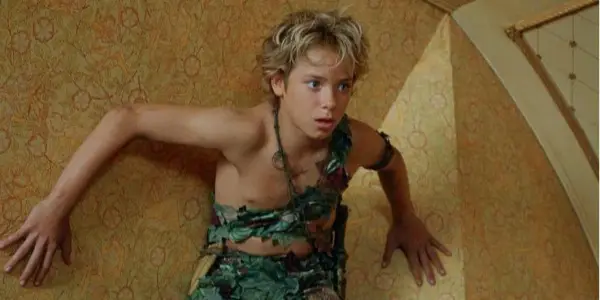
Blame it on a childhood spent dreaming of flying to Neverland, but the story of Peter Pan has always sat close to my heart. Wendy and her brothers’ escape to Neverland taught my youthful self about the joys of adventure and imagination. The 2003 film’s bright pastel colour scheme and magical CGI fairy tale creatures bring J.M Barrie’s wondrous world to life from the book. James Newton Howard (the man behind The Dark Knight, Fantastic Beasts, and The Hunger Games series) does some of his best work in a whimsical and memorable score that captures the thrills and delights of Neverland.
The cast is excellent; the newcomer, Rachel Hurd-Wood has fantastic chemistry with the charismatic Jeremy Sumpter. Jason Isaacs gives my favourite performance of his career in the dual roles of the uptight banker Mr. Darling and the wicked Captain Hook.
As Hook, Isaacs is the perfect fairy tale villain: conniving, manipulative and loving being bad. While the children’s marvellous journey was enough to make any child giddy with excitement, it is the transformation of Mr Darling, who learns to love life again, that proves that while growing old is compulsory (for most), it is growing up that is optional.
Stephanie Archer – The Princess Bride (1987)
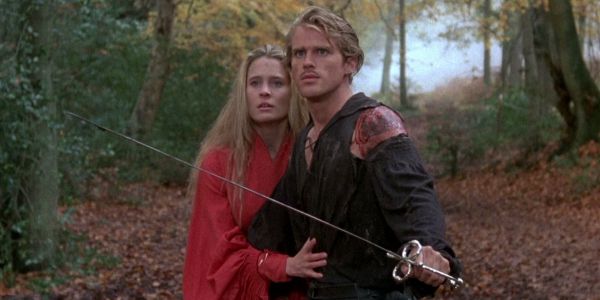
It is “inconceivable” that no one would have a childhood film they hold close to their hearts. Films are an art that we grow up with, our earliest childhood memories most likely along the lines of Mickey Mouse and Disney. As we grow, so do our choices in the films we love. For me, I branched out of the world of Disney and began to find enjoyment in the world of live-action princesses, heroes, and pirates – the dreaded Pirate Robinson no less. While not an immediate success at the box office, The Princess Bride found its success on VHS – my cassette worn after years of replay.
There is a magic in the adaptation of William Goldman’s book of the same name and such a passion that oozes through the screen into the hearts of viewers. Films that are made with great care and respect beget success, and director Rob Reiner and his amazing cast treat this adaptation with a fan’s love. And it has everything that could capture the imagination of a child: sword fighting, true love, a damsel in distress, Giants, Cliffs of Insanity, ROUSes (Rodents of Unusual Size), villains, and unending waves of humor – seriously this is one funny film.
Now as an adult, The Princess Bride is never too far from the mind, quotes always at the ready: “As you Wish”, “My Name is Inigo Montoya…”, “I’m not a witch, I’m your wife!” And “Mwage” are just a handful of the quotes I spew constantly – but what can you expect from such a quotable movie? In the last couple of years, my love for this film has been renewed as it has begun (at times) to be available through various streaming services, as well as with the release of the book As You Wish: Inconceivable Tales from the Making of the Princess Bride by Carey Elwes – a first hand account of Elwes’ time and part in making this endearing classic. Now add the latest “As You Wish” commercial for Culligan Water starring Elwes and I am in Princess Bride euphoria.
As time has shown, The Princess Bride is an undying favorite amongst fans and personally a lasting childhood favorite of mine. It has stood the test of time, finding more success and popularity as the years have passed. This is a film that I will always have a love for – and a film I cannot wait to one day introduce to my children.
Those are some of our childhood favorites! What are yours?
Does content like this matter to you?
Become a Member and support film journalism. Unlock access to all of Film Inquiry`s great articles. Join a community of like-minded readers who are passionate about cinema - get access to our private members Network, give back to independent filmmakers, and more.
Alex is a film addict, TV aficionado, and book lover. He's perfecting his cat dad energy.


